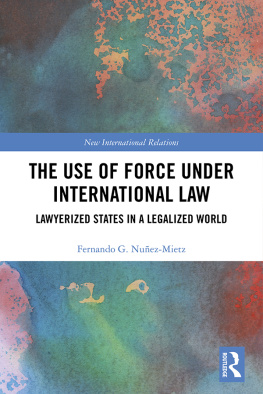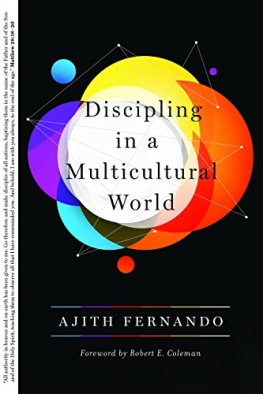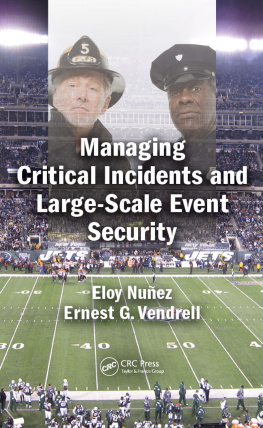The Use of Force under International Law
The international system is becoming increasingly legalized, with legal arguments and legal advisors playing an increasingly important part in the state policymaking process. Presenting a practice-oriented theory of compliance with international law, this book shows how international law affects the behavior of increasingly lawyerized states in an ever more legalized world.
By highlighting the legalization of international legitimation and the lawyerization of policymaking as the new engines of compliance, the books analytical framework rethinks the relationship between state behavior and international law, and provides an empirical focus on security through the study of NATOs military intervention in Yugoslavia in 1999 and the changes in the US detention and interrogation programs in the War on Terror. Relying on primary sources, the author demonstrates the effect of lawyerized decision making on international law compliance, reconstructing the strategies of (de-)legitimation used to show that international law is the hegemonic frame of reference in interstate debates.
This book will be of interest to scholars of international relations, government studies, foreign service studies and lawyers employed in government work.
Fernando G. Nuez-Mietz is a professor in the Department of Political Science at McGill University. He specializes in International Relations, and his research interests are international law and norms, and international security.
New International Relations
Edited by
Richard Little
University of Bristol
Iver B. Neumann
Norwegian Institute of International Affairs (NUPI), Norway
and Jutta Weldes
University of Bristol
The field of international relations has changed dramatically in recent years. This new series will cover the major issues that have emerged and reflect the latest academic thinking in this particular dynamic area.
De-Constructing the Dynamics of World-Societal Order
The Power of Governmentality in Palestine
Jan Busse
Raymond Aron and International Relations
Edited by Olivier Schmitt
Coercive Sanctions and International Conflicts
A Sociological Theory
Mark Daniel Jaeger
Security, Defense Discourse and Identity in NATO and Europe
How France Changed Foreign Policy
Falk Ostermann
Special Relationships in World Politics
Inter-state Friendship and Diplomacy after the Second World War
Kristin Haugevik
Kinship in International Relations
Edited by Kristin Haugevik and Iver B. Neumann
Small States and Shelter Theory
Icelands External Affairs
Baldur Thorhallsson
The Use of Force under International Law
Lawyerized States in a Legalized World
Fernando G. Nuez-Mietz
The Use of Force under International Law
Lawyerized States in a Legalized World
Fernando G. Nuez-Mietz
First published 2019
by Routledge
2 Park Square, Milton Park, Abingdon, Oxon OX14 4RN
and by Routledge
711 Third Avenue, New York, NY 10017
Routledge is an imprint of the Taylor & Francis Group, an informa business
2019 Fernando G. Nuez-Mietz
The right of Fernando G. Nuez-Mietz to be identified as author of this work has been asserted by him in accordance with sections 77 and 78 of the Copyright, Designs and Patents Act 1988.
All rights reserved. No part of this book may be reprinted or reproduced or utilized in any form or by any electronic, mechanical, or other means, now known or hereafter invented, including photocopying and recording, or in any information storage or retrieval system, without permission in writing from the publishers.
Trademark notice: Product or corporate names may be trademarks or registered trademarks, and are used only for identification and explanation without intent to infringe.
British Library Cataloguing-in-Publication Data
A catalogue record for this book is available from the British Library
Library of Congress Cataloging-in-Publication Data
Names: Nunez-Mietz, Fernando G., author.
Title: The use of force under international law : lawyerized states in a legalized world / Fernando G. Nunez-Mietz.
Description: Abingdon, Oxon [UK] ; New York, NY : Routledge, 2018. | Series: New international relations
Identifiers: LCCN 2018029517 (print) | LCCN 2018030630 (ebook) | ISBN 9780429457746 (eBook) | ISBN 9780429855658 (Pdf) | ISBN 9780429855641 (ePub3) | ISBN 9780429855634 (Mobipocket) | ISBN 9781138313163 (hardback)
Subjects: LCSH: Intervention (International law) | TerrorismPreventionLaw and legislation. | Detention of persons.
Classification: LCC KZ6368 (ebook) | LCC KZ6368 .N86 2019 (print) | DDC 341.5/84dc23
LC record available at https://lccn.loc.gov/2018029517
ISBN: 978-1-138-31316-3 (hbk)
ISBN: 978-0-429-45774-6 (ebk)
Typeset in Times New Roman
by Wearset Ltd, Boldon, Tyne and Wear
This book is dedicated to those who are skeptical about the relevance of international law in world politics
Contents
It has often been argued that the unfettered use of force by sovereign states was a distinguishing feature of international relations prior to the twentieth century. From this perspective, then, the Hague Conventions but more especially the establishment of the League of Nations, marked the start of a new epoch in the history of the international society as well as, more specifically, international law. With these developments, efforts were made to render the use of force in international relations illegal. In the first instance, significant attempts were made in both the Hague Conventions of 1899 and 1907 to transcend the use of force and outlaw the institution of war. The aim was to create an international court for the compulsory arbitration of all international disputes between sovereign states. But although a Permanent Court of Arbitration was established in the end it only provided a voluntary forum for arbitration.
More important, therefore, was the Covenant of the League of Nations formulated in 1919 in the wake of World War I. Here attempts were made to move beyond the voluntary agreements established at the Hague Conventions. There was a compulsory requirement for member states either to submit any dispute amongst themselves to arbitration or to seek some other form of judicial settlement at the Leagues Council. This was clearly a step forward but it still did not revoke the right of any sovereign state to go to war. A subsequent attempt to regulate further the right of sovereign states to use force was made in 1928 in a General Treaty for Renunciation of War as an Instrument of National Policy, more generally known as the Kellogg-Briand Pact. This General Treaty was sponsored by France and the United States and was signed by most other members of the international society but it was established outside of the League of Nations, which the United States never joined. Although still in effect the treaty has often been viewed as a meaningless gesture but it can also be seen as a symbolic step along the road to rendering the use of force illegal.
Without doubt, however, the most decisive move to outlaw the use of force from the international society was made when the Charter of the United Nations was agreed in 1945. Article 2(4) of the Charter stipulates that All members shall refrain in their international relations from the threat or use of force against the territorial integrity or political independence of any state. This article remains the most authoritative and overarching legal statement banning the use of force by sovereign states. Nevertheless, it is important to recognize that this is not a blanket prohibition on the use of force within the international society. The Charter goes on in subsequent articles to acknowledge that there are a limited number of circumstances when the use of force is legally permitted. In the first place, the Security Council has the right to authorize collective action to maintain or enforce international peace and security drawing on powers granted in Articles 24 and 25 and Chapter 7 of the Charter. In the second place Article 51 stipulates that Nothing in the present Charter shall impair the inherent right to individual or collective self-defence if an armed attack occurs against a state.














